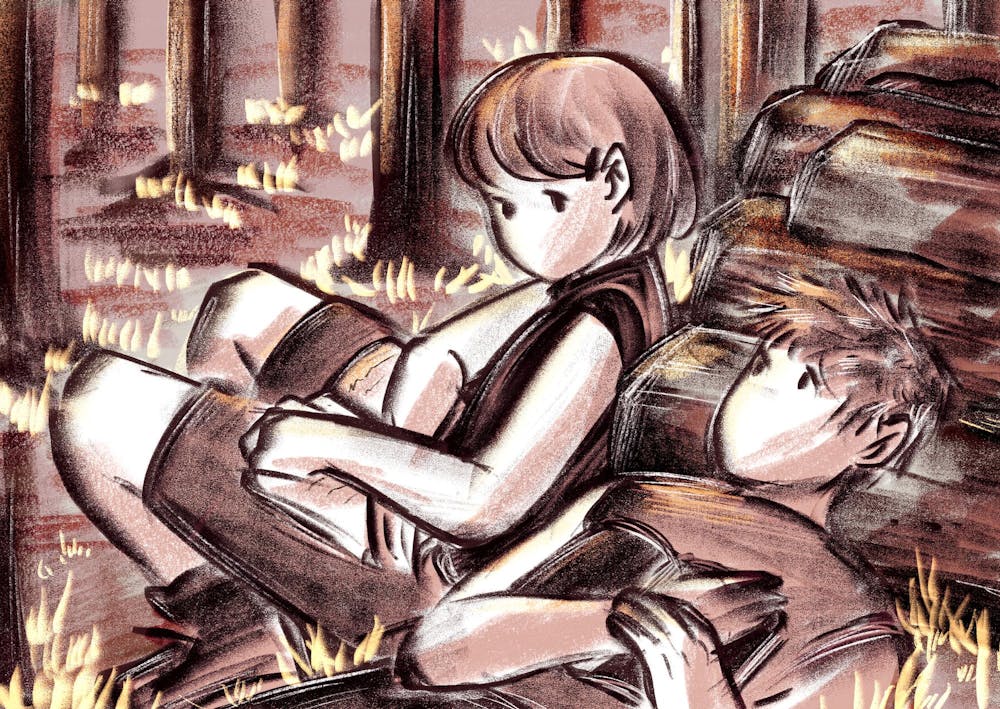In August, it rained for two weeks straight. I had only packed one sweater for a two-month internship, and the threads were thinning out at the cuffs. It was 1:30 a.m.—the latest I had stayed up all summer—and I sat in the corner of my host family’s guest bedroom. I held the fading knit fabric between my fingers, telling myself I was looking for holes, not using it as a security blanket. I had headphones on, and “forwards beckon rebound” by Adrianne Lenker played for the twelfth time that night. My muscles clenched at the refrain. I didn’t have anything to cry about, but I cried anyway. Despite the looks of the scene, I was the happiest I’d been since being at Brown.
I deemed it an Adrianne Lenker summer.
Like other indie folk artists—Bon Iver, Fleet Foxes, The Lumineers—Adrianne Lenker’s return to the pastoral provides an escape from a productivity-centered reality. She doesn’t shy away from the grub and grim of life and love; she speaks with as much nonchalance about bleeding and birth as she does about sleeping in the car. There’s a natural shamelessness to her lyricism and a coarse understated warmth to her voice.
Understatement itself is the core of her music. In “Mythological Beauty,” a song she wrote for her band Big Thief, she tells the story of a young mother through domestic, everyday activities instead of overly verbalizing emotions. Her description of “shrapnel and oil cans, rhubarb in the yard” provides a more whole, unromanticized view of the scene than the previous line, “Rented a house in Nisswa, Minnesota.” Her specificity breeds intimacy, and along with frontal vocals and fingerstyle acoustic guitar, it seems as though Lenker is letting you in on a secret, almost whispering in the room with you. The high-pitched vocals at the climax of the song don’t choke me up like the low and slow “Do you leave your light on?” I may not be or have a young mother, but I know what it feels like to live so on edge that you don’t want to turn off the lights.
Big Thief’s “Velvet Ring” follows a similar structure. Although the story of a couple trying to make ends meet through prostitution carries plenty of weight, the more understated elements of their interactions are the main emotional charge. The song slows down as Lenker sings, “And I just wanna take you home / I just wanna take you home”—two lines that hurl me directly into the fetal position. Small displays of fear or hopelessness or childlike wonder with the backdrop of a more eventful, even chaotic, scene easily catch the ear. They guide the scenes from far-removed impersonal events to familiar feelings.
+++
Lenker’s solo music, on the other hand, tends to abandon clear storylines and demand a complete reliance on emotion. The summer after I graduated high school, I started reading poetry. I had spent the last year searching for symbolism and enjambment whenever I read, but after a few poetryfoundation.org deep dives, I decided to stop treating my interests like assignments. I started reading poems and sitting with feelings, not dwelling on concrete meaning and evidence.
When a friend introduced me to Adrianne Lenker in the second month of my first year at Brown, I took the same approach. I didn’t need to know exactly what she meant. I didn’t need to know what story she was telling. I would cry either way. I subconsciously picked out small words (wind…lack…pray…cradle…) that drenched me in feelings I couldn’t name. Even without a definitive narrative, small words crafted an entire scene.
That’s the beauty in her songwriting: There’s a sense of irrationality to the intense emotions of her songs. It’s not as simple as relating to a breakup song. There’s little reason why a line about standing in the yard conjures strong feelings, but small descriptions, in or out of context, become the essence of her songs. Emotion takes precedence over rationale.
+++
Some of Lenker’s most impactful lines are close to nonsense, only deriving meaning from their context. The first verse of “ingydar” seems more like a clump of words than lyrics to a song at first glance:
Fragilely, gradually and surrounding
The horse lies naked in the shed
Evergreen anodyne decompounding
Flies draw sugar from his head
In an interview with GQ, Adrianne Lenker says about the song, “Everything is constantly being born and decaying simultaneously. We're both growing and becoming, and also unbecoming and decaying simultaneously.” I don’t fully understand the lyrics as they’re written—I don’t know what anodyne is, if evergreen refers to the tree or the color, what the flies are really doing, or why she specifies that the horse is naked—but there is a certain biological element to the lyrics that guides me to feel a push and a pull. The push of a lush evergreen forest and the pull of the clinical-sounding “anodyne.” The push of a sweet sugar and the pull of feeling flies swarm around you. It isn’t the specific idea of birth and death that evokes a sense of optimistic hopelessness. It’s the more general idea of being surrounded by conflicting natural forces.
Lenker’s word choice extends beyond objects that match the energy of the scene. In many cases, the very shape of the word booms or snaps like a shovel in soil or corrugated iron shifting. The melody of the verse of “ingydar” bounces back and forth, echoing the lyrical push and pull. The round, open sounds in “anodyne decompounding” and “the spherical marigold terrain” fit together with the refrain: “Everything eats and is eaten, time is fed.” Cycles fall not necessarily within the semantics of the lyrics but within the phonetics of the words.
Such stark specificity and deliberate care given to the lyricism somehow leaves more room for interpretation. Where one person hears birth and death, another hears pressure from work and school. Although she may include a small foothold, a root like the refrain or the title that establishes the theme, her music doesn’t require the acceptance of her intentions. As verses branch off from the root, their malleability personalizes listening experiences. Even in sadness, her music is cozy because it feels personal. It meets you where you are. On the bedroom floor, “forwards beckon rebound” met me at a time when I needed to unbutton the stress I had stowed away. The next morning, it met me on its thirteenth play as I biked to work. A month later, it met me as I played with my roommate’s cat in our triple.
The last time it rained, I listened to Adrianne Lenker’s 2014 album Hours Were the Birds. As the title track played, I found myself everywhere I’d been while listening to the song: in my first-year dorm after my friend texted the title to me, walking to class in the spring, and in my brother’s apartment over the summer. The familiarity I felt the first time I listened to it carried into the last. I listened to the rain hit the trees outside my window as she sang the last line: “Isn’t this dandy? / I’ve got you, and you’ve got me.”





